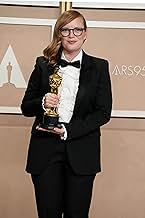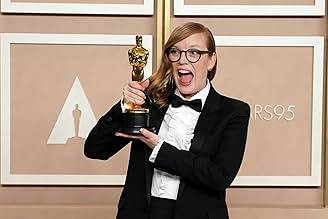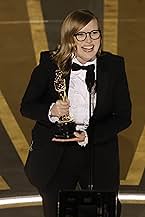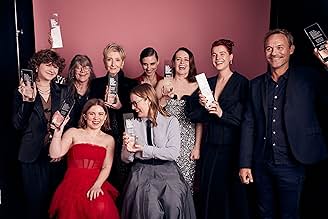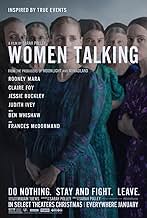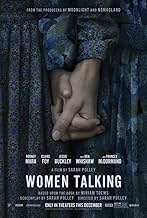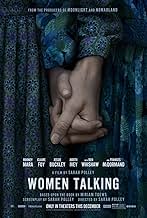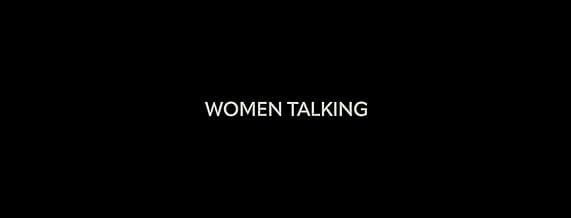Women Talking
- 2022
- Tous publics
- 1h 44m
Do nothing, stay and fight, or leave. In 2010, the women of an isolated religious community grapple with reconciling a brutal reality with their faith.Do nothing, stay and fight, or leave. In 2010, the women of an isolated religious community grapple with reconciling a brutal reality with their faith.Do nothing, stay and fight, or leave. In 2010, the women of an isolated religious community grapple with reconciling a brutal reality with their faith.
- Won 1 Oscar
- 65 wins & 164 nominations total
- Director
- Writers
- All cast & crew
- Production, box office & more at IMDbPro
Featured reviews
This movie needs to be seen in the view of what domestic abuse victims suffer through in their decision process to stay, fight, or leave. Taken in that sense, the conflicts that each woman and the group experience make sense. If you expect a dramatic story within the construct (that of an ultra-conservative fundamentalist community, where the women are kept illiterate and totally subjugated to the men), well then it won't work. These women were much too intelligent to be illiterate, and the men would have been much more a factor in the outcome.
The movie is really about the heartbreaking choices abused women are faced with. Stripped out of the setting and set up, it does work. Suspend disbelief and you will be moved.
The movie is really about the heartbreaking choices abused women are faced with. Stripped out of the setting and set up, it does work. Suspend disbelief and you will be moved.
I wouldn't normally bother to come on here and speak the negatives because, well, who cares? But as there are so few doing it I have to lend my voice. Beautifully well shot and acted, this is easily the dullest time I have had at the cinema in this, admittedly short, 2023 so far. With the splendid reviews (thanks Jim Schembri for being the lone voice on RT) and the stellar cast I was really looking forward to it, and to be fair the visuals and the initial mystery, plus the intriguing, horrid flashes of the crimes being referred to, did hold me fast for the first act. But alas, the second act was merely a repetition of the first, with the same boring conversation ongoing, that stellar cast merely masking the fact that these characters are as paper thin as any from a junky superhero movie. It got no better as it crept sombrely towards the finale, which couldn't have come sooner for me. It does what it says on the tin, so if you'd like to see some women talking, about the same thing, in a barn, for an hour and three quarters, fill your boots.
A few marks for the acting, the score (which really was clever - what a waste) and the cinematography: 4/10.
A few marks for the acting, the score (which really was clever - what a waste) and the cinematography: 4/10.
The fact that the movie is set in 2010 and is based on a true story is not easy to believe. The way things unfold, one would think it is at least in the 50s at the latest for the most part. But the way some cults work, and how people fall for them and spend generations in them is a sad truth of our world. Even though it can be technically called a chamber piece, it doesn't feel like one. There's so much in writing and directing that adds novelty to the story which is not exactly something groundbreaking. There are little moments throughout the film that makes the situation more weird and real at the same time that most films don't do.
There's two movies about sexual assault this year-this and the Harvey Weinstein based 'she said'. I found 'she Said' To be like watching 'spotlight' all over again. It didn't add anything new to the conversation. This does because of its nuances. It's easy to make a 'sexual assault bad' movie but this movie grapples within a religious faith based community where things aren't so black and white. I loved how all the characters represented all points of view-doing something about it, say nothing, etc. I love all the main cast-Claire foy, Jessie Buckley, Rooney Mara. Really great film done subtly on an important subject.
I'll admit up front that this is likely going to be an unpopular review and a decidedly minority opinion, but I have to be honest about my feelings. Writer-director Sarah Polley's adaptation of Miriam Toews's novel of the same name may come from a place of noble intent, and it may feature one of the year's finest acting ensembles, but its overall treatment is a major misfire. This fact-based story about a group of women from a conservative religious colony who meet to discuss how to respond to a series of sexual assaults in their community unfolds in a circular, wooden, stagey fashion that plays more like a university discussion group than a work of dramatic cinema. The ideas raised in these dialogues - ranging from activism to passivity to intergender relations to forgiveness to faith and salvation - are certainly lofty topics for consideration and deliberation, especially in terms of how they might be addressed in the forging of a new and better world. But their handling here is so forced and inauthentic that the entire exercise lacks believability and does little to foster a sense of concerted viewer engagement. And, as the narrative drones on and on, it becomes tediously dull, with one of the characters herself astutely observing that "This is very, very boring" (well said, if a bit ironic). What's more, a number of incidents and themes seemingly arise out of nowhere and aren't always fully resolved, making one wonder why they were included in the first place. Even more disappointing is the fact that the film features so many fine portrayals by performers who are given such stilted material to work with, including Jessie Buckley, Claire Foy, Judith Ivey, Sheila McCarthy, Ben Whishaw and Frances McDormand (whose appearance is more of an afterthought than anything else). Director Polley has certainly made a name for herself with such excellent past works as "Away From Her" (2006), but her reach has certainly exceeded her grasp with this undertaking, one that has much to say but ultimately says so little.
Did you know
- TriviaExplaining the color grading of the film, director Sarah Polley said the filmmakers played with saturation levels to create a feeling of "a world that had faded in the past." This is why the film appears to be almost black and white, but not quite.
- GoofsNettie identifies as a man name "Melvin". The Mennonite do not allow members to identify as anything other than their biological sex and gender. In real life, Nettie would have been excommunicated. There are over one hundred different Anabaptist (Amish, Brethren, Hutterite, Mennonite) church groups, counting more than 6,000 congregations, all holding to slightly different traditions and their own interpretations of the Bible. The movie never identified the Anabaptist group of the colony.
- SoundtracksDaydream Believer
Written by John Stewart
Performed by The Monkees
Courtesy of Rhino Entertainment Company
By arrangement with Warner Music Group Film & TV Licensing
Details
- Release date
- Country of origin
- Official site
- Language
- Also known as
- Ellas hablan
- Filming locations
- Enercare Centre, 100 Princes' Boulevard, Toronto, Ontario, Canada(Barn interior scenes)
- Production companies
- See more company credits at IMDbPro
Box office
- Gross US & Canada
- $5,456,531
- Opening weekend US & Canada
- $40,530
- Dec 25, 2022
- Gross worldwide
- $9,276,103
- Runtime
- 1h 44m(104 min)
- Color
- Aspect ratio
- 2.76 : 1
Contribute to this page
Suggest an edit or add missing content







